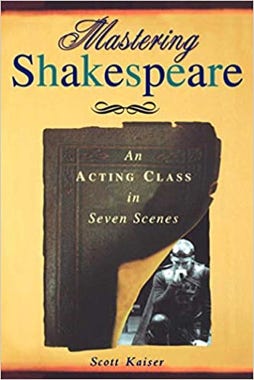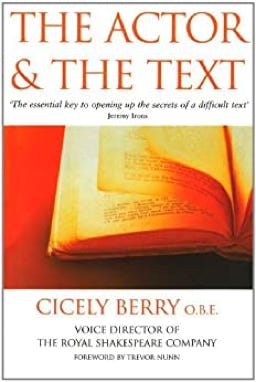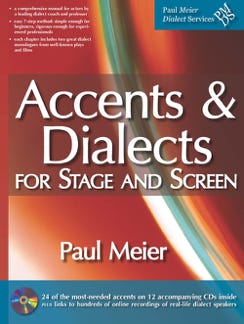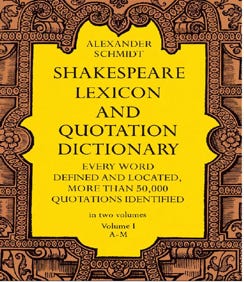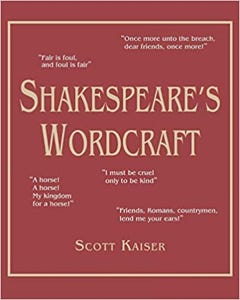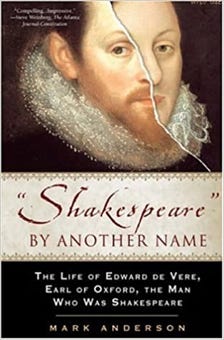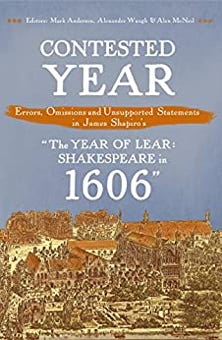Actor Resource Page.
This will be an ever-expanding page of resources
for Shakespearean actors.
Books.
ACTING:
The Shakespeare Masterclasses, edited by Ron Destro.
In a series of masterclasses led by Ron Destro at the Oxford Shakespeare Company, learn the art of acting Shakespeare from Sir Derek Jacobi, Dame Diana Rigg, Tim Pigott-Smith, Frank Langella, F Murray Abraham, Jeremy Irons, Glenda Jackson, Michael York, Ron Cook, Malcolm McKay, Priyanga Burford, John Barton, and Cicely Berry. Insight, humor and acting exercises. A new expanded 2nd edition is coming soon at a lower cost.
Playing Shakespeare by John Barton.
This book (and better yet the DVD series) is considered a complete acting course in Shakespeare performance. Led by the Royal Shakespeare Company's John Barton, the series features nine master classes on Shakespearean performance with 21 of Britain's finest actors, including Judi Dench, Ben Kingsley, Peggy Ashcroft, Ian McKellen, Patrick Stewart, and David Suchet. All episodes are available on YouTube.
Mastering Shakespeare by Scott Kaiser.
This is the best book in learning how to break apart and orchestrate a Shakespeare speech, using 31 set pieces.
Speak the Speech! by Rhonda Silverbush and Sami Plotkin. This is a huge book that goes into great deal giving analysis and acting tips for the majority of the speeches in the canon.
Instant Shakespeare by Louis Fantasia.
Will Power by John Basil and Stephanie Gunning.
VOICE:
Any book by Cicely Berry, former Voice Director for the Royal Shakespeare Company:
Her DVD series:
ACCENTS:
Accents & Dialects for Stage and Screen by Paul Meier.

THE LANGUAGE:
Shakespeare Lexicon and Quotation Dictionary (Volumes I & II) by Alexander Schmidt are the most complete dictionary of the just about every word used in a Shakespeare work. This is a must-have, and the older editions of both volumes are available as free downloads at Google Books (just be sure to download both volumes).
Shakespeare’s Wordcraft by Scott Kaiser is an accessible look at Shakespeare’s use of rhetorical devices to express his genius.
Shakespeare’s Use of the Arts of Language by Sister Miriam Joseph is an academic analysis of the Bard’s use of over 200 rhetorical figures of speech.
The Eloquent Shakespeare by Gary Logan is a pronouncing dictionary for the complete works.
PLAY & CHARACTER ANALYSIS:
Shakespeare A to Z by Charles Boyce is the essential reference to his plays, poems, life and times.
PERIOD RESEARCH:
The Time Traveler’s Guide to Elizabethan England by Ian Mortimer is a complete guide to life in the 16th century.
Shakespeare’s London on 5 Groats a Day by Richard Tames is a briefer overview of life in Elizabethan times.
Life in Elizabethan England, A Compendium of Common Knowledge, is an online collection, found at http://elizabethan.org/compendium/home.html
The Shakespeare Guide to Italy, Retracing the Bard’s Unknown Travels by Richard Paul Roe, pinpoints the exact locations of Shakespeare’s Italian locales.
PLAY TEXTS:
Arden Series with the most thorough annotation.
New Variorum Editions were the original Ardens (many of which are available free at Google Books)
SparkNotes No Fear Shakespeare offer side-by-side pages of Original and Modern text. Many of the plays are free online at https://www.sparknotes.com/shakespeare/
APPS:
The Tempest by Heuristic Shakespeare, is an amazing multimedia tablet app which features the full Arden text (with notes and annotations) and downloadable scene videos so you can see actors such as Sir Ian McKellen and Sir Derek Jacobi perform the text. This is the first of 37. Brilliant!
Shakespeare Pro by PlayShakespeare.com is an app that contains all of the texts with an integrated glossary.
Shakespeare Pronunciation by Shane Ann Younts is a complete audio pronunciation dictionary.
Shakespeare SwipeSpeare by BookCaps is an electronic version of No Fear Shakespeare, allowing the user to view the text in Original, or swipe it and it changes Modern. (full disclosure: I have contributed a section to this app on the Shakespeare Authorship Question).




SHAKESPEARE COACHING:
Ron Destro, founder of the Oxford Shakespeare Company. For UK/Europe summer production workshops click here and for Skype coaching click here.
John Windsor Cunningham, NYC and Skype coaching. http://windsor-cunningham.com
Christopher Martin, founder of Classics Stage Company, NYC.
http://www.christophermartinshakespeare.com
Classics on the Rocks, NYC, Productions and training. https://www.classicsontherocks.org
Shakespeare Forum, NYC productions and training. https://www.theshakespeareforum.org
HB Studio, NYC drama school. https://hbstudio.org
RADA, London drama school, https://www.rada.ac.uk
AUTHORSHIP RESEARCH:
While the authorship question, which has been embraced by many distinguished Shakespeare professionals such as John Gielgud, Mark Rylance, Derek Jacobi, Michael York, Kristin Linklater and Jeremy Irons, knowing the true identity of the writer “Shake-speare” will have little affect on the acting of the works. However, it sometimes provides an answer when there’s a mysterious reference or passage in a play that appears to make little sense. For those interested in this 400-year-old mystery, you may want to look at:
Shakespeare By Another Name by Mark Anderson.
Shakespeare Beyond Doubt? Exposing an Industry in Denial, edited by John M. Shahan and Alexander Waugh.
Contested Year, Errors, Omissions and Unsupported Statements in James Shapiro’s The Year of Lear: Shakespeare in 1606, edited by Mark Anderson, Alexander Waugh and Alex McNeil.
Shakespeare: The Evidence by Ros Barber, an impartial and frequently updated hyper-linked ebook.
Shakespeare in Court by Alexander Waugh.
WEBSITE:
or visit http://oxfordshakespeare.org/Who-was-Shakespeare.html

